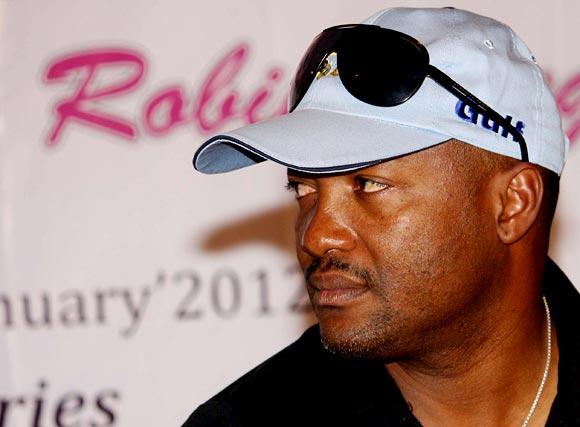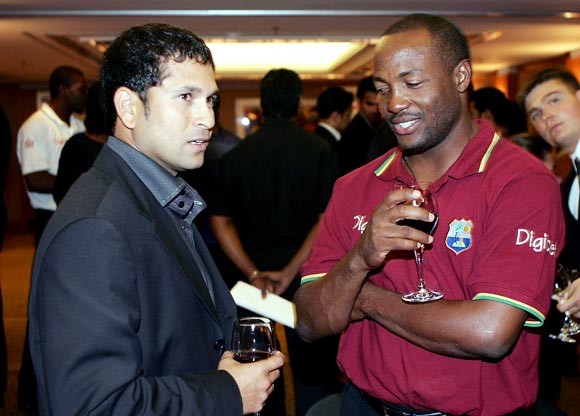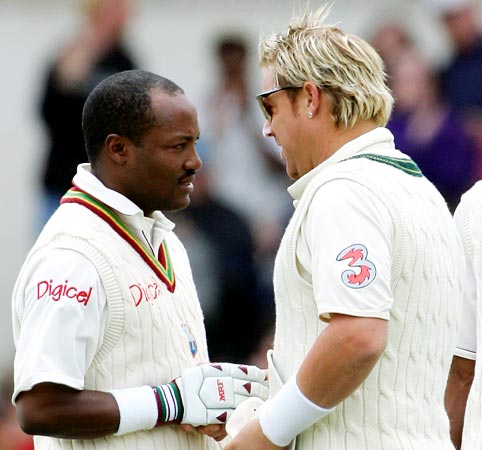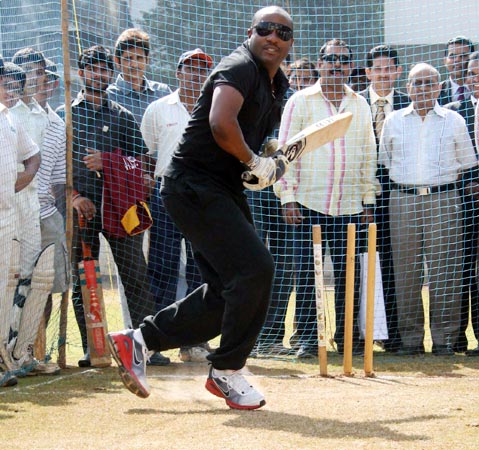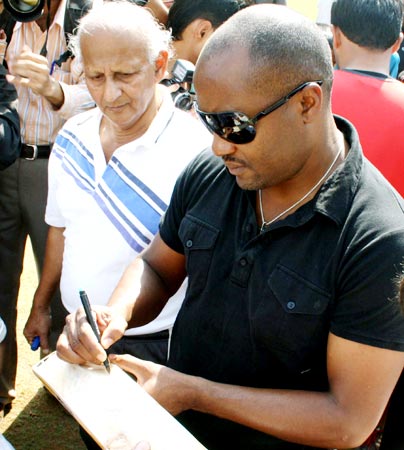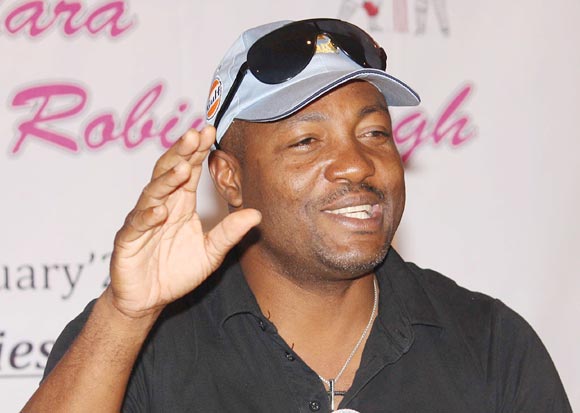 | « Back to article | Print this article |
'Set small little goals at an early age and try to achieve them'
Brian Lara may have given up cricket nearly five years back, but he still commands a lot of attention wherever he goes. And in a cricket-crazy country like India, his fan-following knows no bounds.
Regarded as one of the best batsmen of his era, Lara played 131 Tests and 299 One-Day Internationals for the West Indies. He is the only batsman to score 400 in a Test match, against England at Antigua in 2004. The record for the highest innings in Tests still stands.
He also holds the record for the highest score in first class cricket, 501 not out, playing for Warwickshire, against Durham in 1994.
The former West Indies captain, who is in India as the brand ambassador for Trinidad and Tobago, was at the Khar Gymkhana in Mumbai on Friday. He spent a couple of hours with young kids at the gymkhana, teaching them the finer points of batting, and also revealed what it takes to be the best in the world.
Excerpts from his interaction:
What does it take to be the best player in the world?
I think it starts from very early in your life. Even though you might have goals, like playing for India, it is important to set small goals. It is also important to try and be the best at your gymkhana, at the Under-15 level, Under-19 level or any level that you play.
Throughout my career at school I tried to the best at that level. Obviously, with progression things got even better and with the confidence that I gained from being the best at every single level it was easier for me to challenge even the best in the world. I think that is important.
So set small little goals at an early age and try to achieve them even though you have a big goal or a big dream in place.
I can give you a good example. Like when I was playing Test cricket, whenever I was out of form, I just wanted to get 10 runs, then get to 20 runs, then 30 runs and so on. So by achieving the small little goals, you achieve the bigger ones. So, for me, set small goals and the big ones will take care of themselves.
'Playing for the West Indies for 17 years was an awesome feeling'
How does it feel to be the only man on the planet to get a 100, 200, 300, 400, and, to top it all, a 500?
First of all, it is a great feeling to achieve those landmarks. When I scored 500 I was on 111 with one day to go. You can't think of scoring 390 runs in a day, so there is a bit of destiny.
Scoring 400 runs in a Test match six months after my record was broken by Matthew Hayden was also a momentous occasion.
In cricket it is great to have all these individual milestones. But, most importantly, and most disappointing for me, was that I grew up at a time when West Indies were on top of the world; but throughout my career they sort of declined. They didn't have a strong team like we did have back in the 1970s and 80s. I will give up any record that I have if I could have played in a team, maybe not as invincible we were as in 1970s and 80s, but at least playing in the best teams and beating them. That I think takes a little shine off the achievements.
But for me playing for the West Indies for 17 years was an awesome feeling. To score my first Test hundred was a great feeling and to score 500 was another great feeling. The ICC Champions Trophy 2004 victory and the other great Test victories that we had were much more important milestones and successes than any individual goals.
Talking about the 400 you scored in a Test match against England, were you scared when your score reached 399?
No, I was not scared. Scoring the 400 was a lot easier than the first time when I got the world record score of 375, because then it was a situation I was never in before. I remember that morning I tried to go to sleep, I was on 320 and I could not sleep. I got up at 4am on the clock, I remember I played golf that morning. When I went to bed my hands were sweating. This was all because I was never in that position before. So facing a world record, I was very anxious and I had a few anxious moments when I went out to bat.
But the 400 which came ten years later, because I had gone to those heights already, I was much more comfortable and confident. If you ask me about 375, I can tell you I was in panic.
'Sachin is still the greatest player I have ever seen'
Do you think Sachin Tendulkar will finish on 99 international centuries?
Don't say that. He has 99 centuries and anybody would like to achieve it. He is an awesome player and the best player I have ever seen play the game, at least as a batsman. He would achieve the mark every soon.
Why do you think Sachin Tendulkar is struggling to get his 100th international century?
I have watched his four innings before and I think he looked flawless and on his way to scoring his elusive hundred. But, unfortunately, in Test cricket the guys are not going to give up. So he might get a good delivery or there could a little lapse in concentration. The teams don't want him to get that milestone against them so they snap up everything.
But Sachin is a great player. He is going to score it and we just have to wait and appreciate. If it doesn't happen it doesn't make him any lesser player. He is still the greatest player I have ever seen.
'The best fast bowler that I have faced is Wasim Akram'
Who is the best bowler that you have faced?
Well, the best fast bowler that I have faced is Wasim Akram. I am very happy that I didn't face Curtley Ambrose, because I think he was very special.
The difference between Shane Warne and [Muttiah] Muralitharan is that if you gave me the choice I would face Shane Warne any day. But I would have to say that he was slightly the better bowler, because he was mentally stronger. I had no idea what Murali was bowling in the first half an hour, but as I got accustomed to his bowling he seemed to lose a little bit of confidence and I got on top of him.
But it was not the same with Shane Warne. So, for me, it would be Wasim Akram, and a very close race between Warne and Murali.
'If you want to be the best in the world, you got to play against the best teams'
What is important to succeed in a place like Australia?
First of all, you need to back yourself. What I have encountered with some of the players is that they do not want to come up against the best in the world. That has been one of the biggest motivating factors for me. I think it is the mindset.
If you want to be the best in the world, you got to play against the best teams in the world and match your skills against them. I have seen some players score double centuries or take wickets against the minnows to protect their position, but I don't think that really puts any value to the player for me.
'The best place to bat is from the non-striker's end'
What goes through your mind when you come out to bat?
The first thing that comes to my mind when I come out to bat is survival. Most batsmen are vulnerable early in their innings, so it is important to survive early on. I give the bowlers some percentage, like they have 70 percent chance of getting me out when I have 30 per cent chance of surviving. The longer that I stay out in the middle, not necessarily score runs but check the pace of the wicket and see what the bowlers have to offer, then the balance changes. So, the first thought for me is survival.
There is a famous saying, and I learnt that from Desmond Haynes, that the best place to bat is from the non-striker's end.
How do you approach your batting when out in the middle?
I think it's the approach. If I get to 5 or 10 runs I don't believe that I have seen everything that I need to see. Batting is 10 per cent, 90 per cent mental and sometimes I go out to bat and I get 40 or 50 and everybody thinks that I am going smoothly but even then there is a bowler that I know I have to be careful of. I know he was giving me trouble 45 minutes back and even now I need to be careful.
I don't get overconfident and I believe that is there problem with some of young players in international cricket today. They get to a certain score and they believe that they can go and beat everybody.
I sometimes look at the team situation, and maybe that is why sometimes I get a big score. If you are batting first in a Test match, you can't bat for lunch on the first day. If we are batting first I know my captain won't declare till lunch next day if we are batting well, so my aim is to -- as they call in the West Indies -- bat till the cows come home. Sometimes you see some guy get a 100 and he wants to gets out. But that has never been the problem for me because when I get a hundred I take a mark. So if you bat for session you will put yourself under pressure.
'Give Dhoni a chance'
Do you think it is time for Mahendra Singh Dhoni to step down as the captain? He has lost six Test matches in a row away from home.
I think you should give him a chance. MS Dhoni, with his success in the T20 World Cup [in 2007] in the 50-over World Cup last year, his achievement speaks for itself. Obviously, what happened in England and what is currently happening in Australia, no one will be happy with the situation. But you got to take into context and find out if you have the right team, the right players to play in those conditions. I think it is the conditions that is beating you at the moment. If you were to switch this exact series to India, the result would be exactly different.
If I were to dissect things, I would say that the bowling department is not putting a lot of pressure on the Australian batsmen, and as long as the other side can score 500-600 runs it can put any batting team under pressure. I think India has got a great batting line-up but they will always be under pressure.
First of all, the feeling will be we are not going to get 20 wickets so how will we win a Test match? On the other hand, Australia are coming into the match with the knowledge that if India score 500 they can get 600-700.
Is the Twenty20 version affecting the way players are performing in Test cricket?
Actually, I think it is an asset. The same can be said about when the 50-over game was introduced in the 1970s. Everyone then said it would affect Test cricket but it made Test cricket more attractive and more attacking. So with the Twenty20 version, you are going to get players, who will score quickly. Recently, you had Michael Clarke, who scored a triple century recently [in the second Test against India at Sydney]. Chris Gayle and Virender Sehwag, both have scored two triple centuries in Tests, these guys are known as attacking players and they have been doing really well.
It kind of defines certain players. There are certain players, who play T20 cricket but cannot play Test cricket, but Test cricketers do well at Twenty20 too. But I feel Twenty20 cricket has been a positive inclusion and you are going to see even better cricketers. And now you can see more results in Test cricket.
